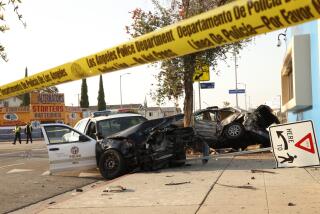Steer Clear of Cars With a Checkered Past
- Share via
It isn’t difficult to determine the kind of used vehicle to buy: If you need a truck, you’ll probably resist buying a sports car.
But when it comes to vehicles you shouldn’t buy, most of us have nothing to go on except vague ideas about “lemons.”
With that in mind, here are some guidelines to help you avoid falling for vehicles that could leave you wishing you had kept “Old Faithful” or sprung for a brand-new model instead.
If, on the other hand, you are hopelessly infatuated by one of these, be sure to have your mechanic check it out meticulously before you buy.
Our list of cars and trucks to at least think twice about:
* Models that are out of production. Unless the auto maker stocks parts for many years, vital components for discontinued models may no longer be available when you need them.
* Vehicles with modified engines. If a major change has been made to the original equipment, the defective part--or the new one--may have damaged other systems.
* Souped-up sports cars. Most perform poorly at low speeds and in stop-and-go traffic, or they may have been worn out by leading fast lives.
* Almost-new vehicles. Unless it has just come off a short lease, the reason it may be available so soon is that it is a lemon or has been in a wreck.
* Old vehicles with low mileage. Unless you’ve met the “little old lady” who owns it personally, chances are the odometer has been set back.
* Former taxis, fleet cars or police vehicles. These workhorses are often worn out and ready for pasture because they’ve been driven mercilessly for miles and miles by people who neither owned nor cared for them.
* Secondhand station wagons: Check these out very thoroughly. If you don’t know the vehicle personally, it may have been owned by a traveling salesperson who drove it 50,000 miles a year or more.
* Commercial trucks and vans. The suspension and transmission may have hauled too many heavy loads for too many miles.
* Vehicles that have been wrecked and repaired. The frame may be out of alignment, the steering may be damaged, and welds or body filler may not hold. Even if you believe one of these is as good as new, when you are ready to sell one day, potential buyers may disagree.
* Salvaged vehicles. These are cars or trucks that were so badly damaged that the insurer, owner, lessor or loan agency considered them uneconomical to repair. Since insurance companies automatically deduct 40% from the value if a DMV or National Insurance Crime Bureau search shows that a vehicle has been salvaged, either have the price lowered by 40% or don’t buy it.
* Models that have been recalled for defective parts. To see if the car or truck you like has been subject to a recall, call the U.S. Department of Transportation’s toll-free auto safety hotline, (800) 424-9393, or check out the agency’s Web site, https://www.nhtsa.dot.gov. If the vehicle has been recalled, it may be hard to tell whether the proper repairs or replacements were made.
* Pre-1992 vehicles with defective air conditioners. The Environmental Protection Agency has declared the R-12 Freon refrigerant in these models to be environmentally unsafe. Though your dealer may agree to service and refill the air conditioner with R-12, it will become increasingly expensive and hard to find. And, ultimately, when the supply runs out, converting to the new refrigerant, R-134a, may cost you a pretty penny.
* “Gray” cars: Be sure that any foreign-built car less than 25 years old has been certified to meet DOT and EPA emissions and safety specifications, has entered the country through a DOT-registered importer and was modified to meet U.S. regulations. Although these vehicles may come with valid titles, the titles only prove ownership and do not indicate that the vehicle is legally drivable. If you unknowingly buy one, it can be impounded or cause insurance problems.
* Possibly stolen vehicles. Even if you didn’t know your used car or truck was stolen, it’s your loss if the police repossess it. Have the Department of Motor Vehicles search the title by the vehicle identification number, or VIN, or by the current owner’s name.
(For clues that identify possibly stolen vehicles, see the accompanying box.)
* And, of course, lemons. California defines a lemon as a vehicle that has spent more than 30 days at a dealership for repairs during its first year of ownership or that the dealer couldn’t repair after four tries within that first 12 months or 12,000 miles of the vehicle’s purchase. Despite this, auto makers have consistently found ways to put these losers back on the market disguised as ordinary used cars.
For a summary of lemon laws, a direct link to the proper person to handle a complaint (usually the state attorney general) and lawyers who specialize in this area, try Autopedia, the online automotive resource, at https://www.autopedia.com. Another good site is the Lemon Aid Stand at https://www.pond.net/ ~delvis/lemonaid.html.
Highway 1 contributor Deanna Sclar is the Los Angeles-based author of “Buying a Car for Dummies” (1998) and “Auto Repair for Dummies” (1999), both from IDG Books.
How to Spot a Stolen Car
These signs can protect you from buying a vehicle that has been stolen:
* The registration is from a state far from where the vehicle is being sold.
* The license number on the registration doesn’t match the plates on the car.
* The license plate is brand new or mounted with new-looking bolts.
* The title is in the dealer’s name rather than that of the previous owner.
* The vehicle identification number on the title doesn’t agree with the VIN on the body or other parts, or the VIN plate is missing, loose, repainted or painted over.
If you are uncertain, the National Insurance Crime Bureau--at (800) 835-6422 or https://www.nicb.org-- can use the VIN to provide a vehicle’s ownership history and salvage record.
* The ID numbers have been removed from the engine.
* The original keys are missing; only duplicates are available.
* The ignition switch is loose or shows signs of tampering.
* The vehicle is priced far below what it’s worth.






